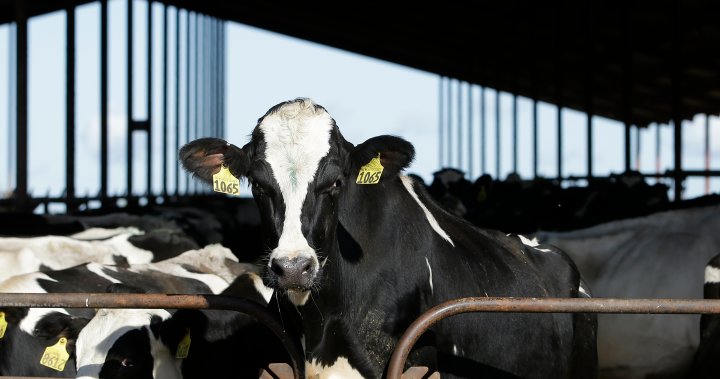Just past the border, right on Canada’s doorstep, the United States is witnessing the return of a miserable and now-familiar fact of life in a pandemic entering its third winter.
Cases are surging in northern states — to record levels in some areas — as America’s hottest COVID-19 hotspots are once again places with the coldest winters.
The annual human retreat to indoor spaces has abetted transmission in places like Michigan, Minnesota and Vermont —and created new dilemmas for Canadians.
At least one municipal body is now cautioning against cross-border trips.
The public-health authority of Thunder Bay, Ont., has urged against non-essential travel to Minnesota, Wisconsin and Michigan where case rates are much higher than Canada’s.
‘Consider not doing that travel at this time’
“They’re at least 10 times [higher in Minnesota than] our rates here,” Dr. Janet DeMille, Thunder Bay’s medical officer of health, told CBC News.
“You could very easily bring it back to our area. … Consider not doing that travel at this time.”
DeMille blamed a few factors for the delta wave gaining strength: the winter weather, school re-openings, increased travel and the looser pandemic practices in the U.S. (including lower vaccination rates).
“[It’s] getting colder. It’s getting darker. We’re not out so much. Maybe we’re getting together more in indoor spaces,” she said. “All this contributes to the spread of the virus.”
It could also contribute to a post-holiday surge in Canada, she said.
There’s a pattern in the current pandemic case spread that shows cases rising as temperatures drop — increasing the further north you travel, as more people head indoors to stay warm.
Record caseloads in some northern U.S. states
That’s a geographic change from summer months, when southern states suffered a pandemic pounding as people went into air-conditioned places to escape the heat.
If you were to head up the Eastern Seaboard of the United States now, the further north you moved, the faster you’d see cases rising.
Caseloads would start to mount as you left Florida’s sweat-inducing sunshine for the temperate Georgia winter, continue inching upward in the cooler Carolinas, rise further in Virginia and then Pennsylvania, before exploding along the Canadian border in Michigan, New York and Vermont, where frost is settling in for the winter.
For context: The caseloads in Michigan, Minnesota, Vermont and New Hampshire over the last week ranged between 500 and 649 cases per 100,000 residents, compared to 59 in Florida and 61 in Texas.
In Canada the seven-day caseload was about 60 per 100,000. In Ontario it was 48.
Some of that gap might be attributable to differences in the availability of testing. In the U.S., it’s cheap and relatively easy to get rapid tests at pharmacies.
But methodological quirks can’t explain away this whole gap.
It’s a different story for the vaccinated
The death rate in the U.S. per-capita has been six or seven times higher than in Canada in the last few weeks — and among the highest recorded internationally.
Over the long term, most of the hardest-hit states have been in the U.S. South, where death rates have generally been higher.
Vaccination makes a huge difference in outcomes and is believed to be why some of the northern states with higher current case rates aren’t suffering much higher death rates.
Michigan has just smashed its hospitalization record for COVID-19 but an overwhelming majority of those in its intensive care units (ICUs) — 87 per cent — are unvaccinated.
And in Washington, D.C. — which has high vaccination rates — cases are rising, but only one person has died from COVID-19 in the last two months, officials say.
U.S. military assists hospitals in some states struck by wave:
Military medical teams are headed to Michigan and New Mexico to assist hospitals in fighting <a href=”https://twitter.com/hashtag/COVID19?src=hash&ref_src=twsrc%5Etfw”>#COVID19</a>. They join eight other teams currently working in Montana, Colorado, Minnesota, Utah and Idaho. Learn more here:<a href=”https://t.co/s79Wmepfa6″>https://t.co/s79Wmepfa6</a><a href=”https://twitter.com/USArmyNorth?ref_src=twsrc%5Etfw”>@USArmyNorth</a> <a href=”https://twitter.com/fema?ref_src=twsrc%5Etfw”>@FEMA</a> <a href=”https://twitter.com/DeptofDefense?ref_src=twsrc%5Etfw”>@DeptofDefense</a> <a href=”https://t.co/Rdq63HAQ3B”>pic.twitter.com/Rdq63HAQ3B</a>
—@USNorthernCmd
“We have the tools to stay safe. The people showing up with COVID and filling up our hospital beds are unvaccinated. That’s a choice people have made. Unfortunately,” Michigan Gov. Gretchen Whitmer told a Grand Rapids, Mich., television station.
The same pattern appears in Canada. Ontario‘s rate of infection is nearly quadruple for unvaccinated people compared to fully vaccinated people.
So, what about travel?
That’s why one epidemiologist says if you want to travel, you should try getting a booster shot first.
“I would say it’s essential — especially if you’re planning to travel,” said Saverio Stranges, chair of the department of epidemiology and biostatistics at Western University’s Schulich School of Medicine based in London, Ont.
Pfizer has said one study showed a third shot producing 25 times more antibodies.
So, about travel: Would these experts do it themselves?
Stranges has some U.S. relatives visiting for the holidays. But he and his family cancelled plans for two other trips — one to Italy and the other to upstate New York — they planned on making for other family gatherings.
“I gave up the flight [to Italy],” he said. “It is extremely upsetting. It is difficult to cope with not seeing family.”
He said he based his decision on a series of factors, including that one of his relatives has co-morbidities and is at a higher risk of suffering serious effects from COVID-19. He also said he didn’t want to risk spreading the virus and overburdening hospitals.
Stranges said he knows of cases where unvaccinated children spread the disease and got older people mortally ill.
Still, Stranges does not believe it’s time to tighten travel rules, saying he believes those in place are sufficiently stringent.
Canada just re-tightened its regulations for travellers and now requires a quarantine until the results come in from a post-arrival test from every country except the U.S.
Some travelers from countries in Africa have described “grim things” and “complete madness” after being forced into quarantine hotels.
‘I’d just be cautious’
Another infectious-disease expert agreed with Stranges that the overall rules don’t need tightening, but said he would be extra careful about traveling and would get a COVID-19 vaccine booster shot, if possible.
Jason Kindrachuk of the Winnipeg-based University of Manitoba said one way to be cautious is to get a plane ticket with cancellation insurance.
If he started having doubts after he and his wife bought a plane ticket to a place where caseloads worsened, he said: “We would cancel in a second.”
That said, at this point in time, he’d be personally okay with travelling to the U.S. “I’d just be cautious.”






More Stories
King Charles set to resume public duties after stepping away for cancer treatment | CBC News
Winnipeg father guilty of manslaughter after shaking, hitting or throwing infant son in 2020: judge | CBC News
Regina police officer accidentally shot during residence search – Regina | Globalnews.ca